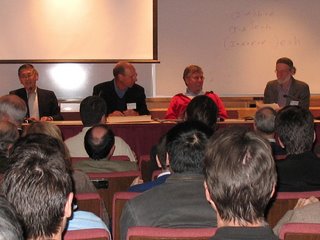Happy Birthday, INGRES!

If you were born after 1976, you have never known a time without relational databases, a time when you couldn't build outside joins or conditional queries across multiple tables.
Last week I went to the 30th anniversary party for INGRES, the relational database invented at U.C. Berkeley. I went because I was the very first support engineer at Sun Microsystems to support INGRES. The event was really the anniversary of a paper titled "The Design and Implementation of INGRES". From left to right, the authors are Eugene Wong, Jerry Held, Michael Stonebraker, and Peter Kreps.
INGRES was the first broadly used relational database. 30 years ago, IBM (remember they owned the computer market then) offered a hierarchical database and AT&T (remember they owned the telecommunications market then) Bell Labs had just hatched UNIX. Recognizing that the big card reading computer on campus wouldn't work for their concept, Gene Wong remembered how the INGRES team was just able to scrape up enough money for a DEC PDP-11/45, the smallest DEC machine that would run UNIX. It cost about $100k.
Each of the four inventors remembered funny little stories, like the time the new 16-kB memory board blew up when it was installed upside down. Jerry Held gave a good overview of ten ingredients to commercial success. Mike Stonebreaker drew parallels between that time 30 years ago when IBM's hierarchical database technology failed to meet certain market needs, and now, when Oracle's relational database technology is running out of steam for applications like genomics.
The inventors complained that cuts in government R&D funding are stifling the kind of innovation that made INGRES possible.
The miracle is that these four guys, working in a university computer lab with scant resources, made such a gigantic change in the way our world works. 30 years later, relational databases are ubiquitous. You may well carry one in your cell phone.
The 30th Anniversary of INGRES was a good reminder that emerging new technologies rarely happen without Lady Luck. Edgar Codd had just written his seminal paper on a relational model for databases. The inventors chose UNIX without every having used it, and UNIX turned out to be one of the most popular operating systems. They distributed source code to other schools, a prescient move that spurred adoption of the technology. They ran into the resources, ideas, and each other at a time when the market demanded a better solution. All the stars lined up. The timing was right.

0 Comments:
Post a Comment
Subscribe to Post Comments [Atom]
<< Home